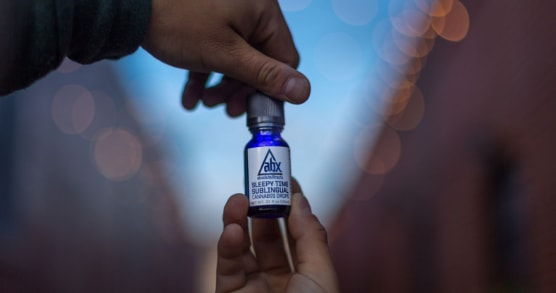Cannabinoids Explained: Delta-8 THC
Delta-8 THC (tetrahydrocannabinol) is a psychoactive cannabinoid that has recently gained popularity due to its similarity to delta-9 THC. Written by Anna Barberena.
What is Delta-8?
Delta-8-THC is an isomer of delta-9-THC, which means they are similar in their atomic structure but they are not identical. It is not as intoxicating as delta-9-THC but still produces a mildly intoxicating effect. Delta-8-THC binds to the CB1 receptor but, because it is structurally different, it doesn’t bind to the receptor in the same way. It is believed that the difference in how it binds to the receptor is what causes it to be less potent than delta-9-THC. It usually only exists in minute amounts in cannabis flowers but because of its unique effects many companies are attempting to isolate and enhance the cannabinoid. A study done in 1995, years before this cannabinoid made its big debut, showed that delta-8-THC was able to completely stop chemotherapy induced vomiting in pediatric patients without any major side effects (1).

There is a lack of current research into the effects of delta-8-THC but users report effects of:
- Less intoxication than THC so, for many, it is an easy introduction to feeling high
- Helps reduce nausea (antiemetic)
- Prevention of vomiting caused by cancer treatment
- Positive mental health benefits like anxiety reduction
- Increase in appetite
- Pain reduction (analgesic)
Entourage Effect
- When delta-8-THC is combined with CBD, the intoxicating effects of delta-8-THC are reduced but the therapeutic effects of both cannabinoids are enhanced (2, 3)
- More studies are needed to understand other synergistic effects
Conditions Delta-8-THC May Be Beneficial For
- Chronic pain
- Sleeping issues
- Anxiety
- Depression
- Digestive upset
- Eating disorders
Potential Adverse Side Effects
- Sedation
- Grogginess
- Red eyes
- Dry mouth
- Short-term memory loss
- Increase in appetite
- Anxiety or paranoia
- Potential medication interactions
Citations:
- Abrahamov A, Abrahamov A, Mechoulam R. An efficient new cannabinoid antiemetic in pediatric oncology. Life Sci. 1995;56(23-24):2097-102. doi: 10.1016/0024-3205(95)00194-b. PMID: 7776837.
- Pertwee, Roger G. “Cannabinoid pharmacology: the first 66 years.” British journal of pharmacology vol. 147 Suppl 1,Suppl 1 (2006): S163-71. doi:10.1038/sj.bjp.0706406
- Thomas A, Baillie GL, Phillips AM, Razdan RK, Ross RA, Pertwee RG. Cannabidiol displays unexpectedly high potency as an antagonist of CB1 and CB2 receptor agonists in vitro. Br J Pharmacol. 2007 Mar;150(5):613-23. doi: 10.1038/sj.bjp.0707133. Epub 2007 Jan 22. PMID: 17245363; PMCID: PMC2189767.
DISCLAIMER: THIS SITE DOES NOT PROVIDE MEDICAL ADVICE.
All information, including but not limited to, text, graphics, images and other materials contained on this site are for informational purposes only. No text, graphics, images or other materials on this site are intended to be professional medical advice or a substitute for professional medical advice, diagnosis or treatment. Always seek the advice of your physician or other qualified health care provider with any questions you may have regarding a medical condition or treatment and before undertaking a new health care regimen, and never disregard professional medical advice or delay in seeking professional medical advice because of something you have viewed on this site.
DISCLAIMER: THIS SITE DOES NOT PROVIDE MEDICAL ADVICE.
All information, including but not limited to, text, graphics, images and other materials contained on this site are for informational purposes only. No text, graphics, images or other materials on this site are intended to be professional medical advice or a substitute for professional medical advice, diagnosis or treatment. Always seek the advice of your physician or other qualified health care provider with any questions you may have regarding a medical condition or treatment and before undertaking a new health care regimen, and never disregard professional medical advice or delay in seeking professional medical advice because of something you have viewed on this site.



